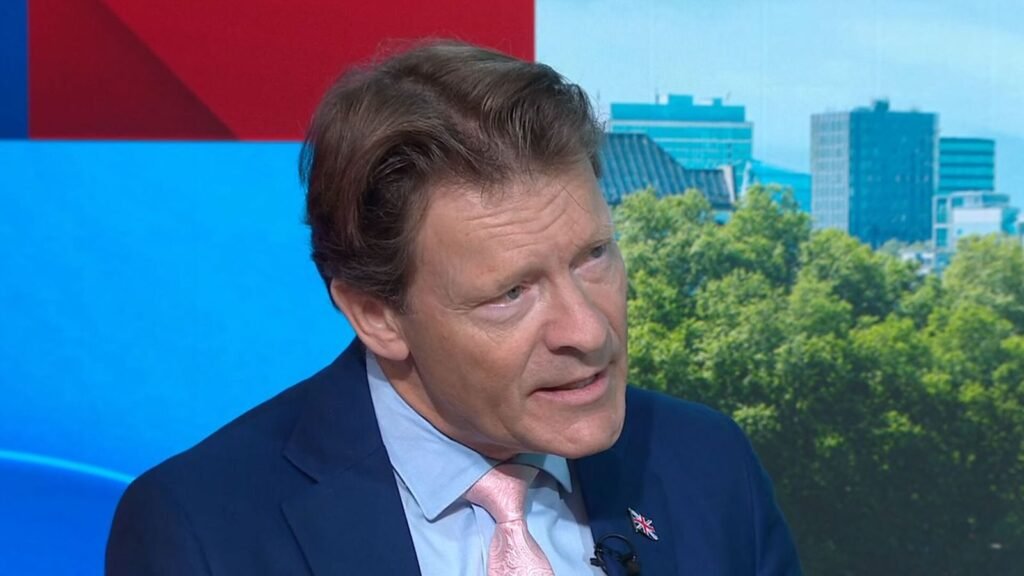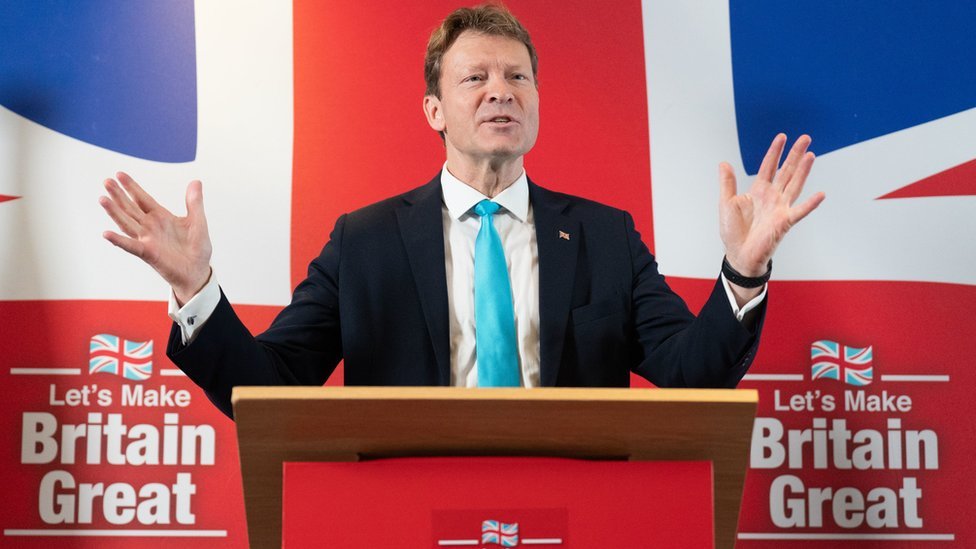The Commons chamber was already tense, but no one expected the explosion that came just moments into the emergency session called over the ongoing migrant hotel scandal. Sir Keir Starmer, typically composed even under pressure, launched into an uncharacteristically aggressive tirade against Reform UK leader Richard Tice, shocking fellow MPs, political commentators, and millions watching at home.
It began with an innocuous enough provocation — or so it seemed. Richard Tice, seated prominently across the aisle and buoyed by a week of viral Reform UK social media wins, had come prepared to capitalize on the public outrage. Rising to speak, Tice wasted no time in condemning what he called the “cowardice and duplicity” of Labour’s stance on illegal migration. Cameras zoomed in as Tice, voice booming, declared that Labour had “enabled an invasion disguised as humanitarian policy” and accused the opposition leader of “selling out British communities to globalist doctrine.”

The words were no doubt calculated — a direct challenge, a red rag to a bull. Starmer, whose patience had clearly worn thin after weeks of being baited in headlines and debate panels, didn’t hesitate. Slamming his hand against the dispatch box, he rose with a sharpness that drew a hush over the chamber. The Speaker called for order, but Starmer wasn’t waiting for permission.
Related Post: Watch how Nigel Farage HUMILIATES David Lammy After “Hitler Comments” RESIGNATION LOOMING!
“Enough,” Starmer barked, his voice trembling not with fear but with fury. “I will not sit here and be lectured by the leader of a political sideshow built entirely on fear, division, and Twitter rage. While we’ve been working to fix a system the Conservatives broke, Mr. Tice has been busy fanning flames from the sidelines, offering no solutions — only slogans.”
The chamber erupted. Gasps, shouts, even a few cheers from the Labour backbenches. But Starmer wasn’t done.
“Let’s talk about these so-called ‘migrant hotels,’ shall we?” Starmer continued. “The result of a broken asylum system, years in the making. A crisis not created by compassion, but by incompetence. A government — and I include your Reform cronies in this — who cut processing staff, slashed foreign aid, and now have the gall to blame desperate families fleeing war zones for the very chaos your ideology created.”
Tice, visibly thrown, attempted to interject, but Starmer held the floor like a seasoned barrister back in court. The Labour leader had snapped, and the result was a political maelstrom — one that would dominate headlines, timelines, and talk shows for days to come.
“You talk about ‘protecting British culture,’” Starmer said, voice rising. “What culture are you protecting, Mr. Tice? The one where we demonize the vulnerable to score political points? The culture where we pretend there’s an easy fix to complex international crises? You don’t speak for Britain. You speak for a corner of the internet echo chamber that thrives on resentment and revisionist history.”
The Speaker stood, calling once more for decorum, but the floodgates had opened. Starmer’s outburst, though shocking, struck a nerve that many across the political spectrum had felt bubbling under the surface. Labour MPs, long frustrated by the creeping normalization of inflammatory rhetoric on immigration, looked visibly energized. Even some on the Tory benches appeared caught off guard by the raw emotion of Starmer’s speech — a rare break from his usually calculated, reserved persona.
Tice, never one to back down from a fight, eventually responded in kind. Rising slowly, arms crossed, he waited until the Speaker regained order before launching into his own rebuttal.

“Sir Keir talks about complexity,” Tice sneered, “because complexity is the refuge of the weak. We need clarity, not cowardice. The British people are sick of politicians who talk down to them while hiding behind red tape and moral relativism. You can dress up your failure in compassion all you like, but the facts remain: thousands are arriving illegally, being housed at taxpayer expense, while British veterans sleep on the streets. That’s not a system. That’s surrender.”
It was a populist broadside that played directly into Reform UK’s message — hard lines, strong words, and no apologies. The chamber was now in full theater mode. What had begun as an emergency discussion about hotel overflows had become a defining moment in the ongoing culture war over Britain’s borders, identity, and political soul.
Starmer shot back instantly. “You want to talk facts? Let’s look at the numbers. Do you know who started using hotels? Your Conservative allies — in 2020. Because they slashed infrastructure funding and let the asylum process rot from the inside. You’re pretending to be the cure, but you were part of the disease from day one.”
At this, murmurs swept through the chamber. Even veteran reporters in the press gallery were seen shaking their heads in disbelief — not because Starmer was wrong, but because of how uncharacteristically brutal his delivery was.
This wasn’t the usual Westminster point-scoring. This was a gloves-off brawl playing out on national television, and both sides were swinging with everything they had.
In the hours that followed, social media exploded. Hashtags like #StarmerMeltdown, #TiceVsStarmer, and #MigrantHotelCrisis began trending across X (formerly Twitter), TikTok, and Instagram. Clips of Starmer slamming the dispatch box circulated with millions of views within the first hour. Reform UK’s official account posted a short, sharply-edited video of Tice calling Starmer a “coward in a silk tie,” while Labour’s rapid-response team countered with a montage of Tice’s past statements on immigration — some of which had aged poorly in the current climate.
But the real story wasn’t the memes. It was the shifting perception of Starmer. For months, critics had painted him as wooden, cautious, even boring. But in one 12-minute explosion, he had rebranded himself — not as a populist, but as a man willing to fight fire with fire.
Insiders from within Labour’s shadow cabinet confirmed the outburst wasn’t planned. “We didn’t know that was coming,” one aide said. “But we’re not sorry it did.”
Behind closed doors, Labour strategists were reportedly already debating how to capitalize on the moment. Some saw it as a chance to reframe Starmer as a passionate patriot, not just a lawyerly technocrat. Others worried that matching the right’s aggressive tone could backfire, alienating moderate voters.
Meanwhile, Richard Tice and his team wasted no time in declaring victory. Speaking to GB News just hours after the Commons clash, Tice said, “The mask slipped today. Starmer showed his contempt for the British people. He doesn’t want a debate — he wants obedience.”
But not everyone agreed. In a surprise twist, several centrist commentators — including former Tory advisers — praised Starmer’s fire. “Tice got what he wanted,” wrote one columnist. “But so did Starmer. For the first time in months, he looked like someone willing to lead — and fight.”
Watch on YouTube
The migrant hotel crisis remains unresolved. Over 180 hotels across the UK continue to be used as temporary accommodation for asylum seekers, with costs exceeding £8 million per day. The government’s long-promised Rwanda plan remains mired in legal challenges, and local councils are increasingly vocal about the strain placed on services.
In the wake of the Starmer-Tice showdown, public discourse around immigration policy has reached a boiling point. Reform UK’s polling numbers — already rising — are expected to get a fresh bump. But so, too, might Labour’s, as working-class voters frustrated with political inaction see in Starmer a new willingness to confront the populist right head-on.
As one seasoned political analyst noted: “This wasn’t just a spat. It was a signal. The next election won’t be won on policy papers. It’ll be won in moments like this — raw, emotional, unscripted.”